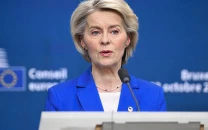COP29 must go beyond promises
The time has come for wealthy nations to deliver on their obligations, and finance the Fund.

This week, leaders from all over the world are heading to COP29 in Baku, Azerbaijan. For nearly three decades, they have gathered at the annual Conference of Parties (COP) to the UN Framework Convention on Climate Change.
This year, they must not only set more ambitious targets to reduce greenhouse gas emissions, but deliver on Climate justice.
Last month, I visited Pakistan’s northern areas, where the United Nations and its partners support communities to adapt to climate change and mitigate its impacts. I met with communities in Chitral who are facing an existential threat.
As global warming causes glaciers to melt, catastrophic glacial lake outbursts floods threaten not only their livelihoods, but also their lives. They face the devastation brought out by our warming world -- changing weather patterns, scorching heatwaves, brutal droughts, and devastating floods.
As I spoke to Chitrali communities, I reflected on the paradox that people in Pakistan, who emit a tiny fraction of the world’s CO2 emissions, are so disproportionately affected by climate change effects. Through no fault of their own, they are living with its catastrophic impacts, often experienced on top of deep poverty.
This month, people in Lahore were left gasping for air as their day to day lives and the city’s architectural wonders disappeared in toxic smog. The World Bank estimated the damages the 2022 floods inflicted on Pakistan at around 30 billion dollars.
However, only $2.8 billion in flood relief funds have been received out of a total of $11 billion pledged by international donors. Pakistan, already mired in debt, was compelled to take out hundreds millions in loans to fund the reconstruction of homes and infrastructure.
Pakistan should not have to pay wealthy nations back for the cost of the climate-related damages which they caused in the first place.
Today, only drastic action can keep alive the crucial goal of limiting global warming to 1.5 degrees Celsius (2.7 degrees Fahrenheit). This is the first priority at the Conference of Parties (COP) to the UN Framework Convention on Climate Change. But COP must also deliver on the second priority: help climate-vulnerable nations cope with the consequences of the warming world.
Two years ago, Pakistan and the UN convinced delegates to create a Climate Loss and Damage Fund that can help vulnerable countries recover from climate change. Last year, industrialized nations pledged USD $700 million of the 400 billion dollars that lower-income countries estimate they need by 2030 which is–less than 0.2 per cent.
The time has come for wealthy nations to deliver on their obligations, and finance the Fund. This financial assistance must come not as loans, but as grants. It must consist in new funding specifically dedicated to climate adaptation and resilience-building.This is not about charity -- this is about climate justice, which is why we must complement the Climate Loss & Damage Fund with reforms in the international financial architecture.
This includes adopting effective debt relief mechanisms that allow countries like Pakistan to make meaningful progress towards the achievement of the Sustainable Development Goals (SDGs), rather than exacerbate their debt burden further in seeking to cope with climate change impacts.
In September, our world leaders gathered in New York agreed on a Pact for the Future to adapt international cooperation to the challenges of tomorrow. It is time for both climate justice – and common sense – to prevail. COP29 is dubbed the “finance COP” as delegates will try and agree on a New Collective Quantified Goal on Climate Finance.
It must go beyond the unfilled promises of the past. With only five years left before the deadline to achieve the SDGs, the world must recognize and act in response to the disproportionate suffering that Pakistan and other climate-vulnerable countries have already endured, which directly hinders development progress. The United Nations will be on Pakistan’s side as it leads the way.



















COMMENTS
Comments are moderated and generally will be posted if they are on-topic and not abusive.
For more information, please see our Comments FAQ